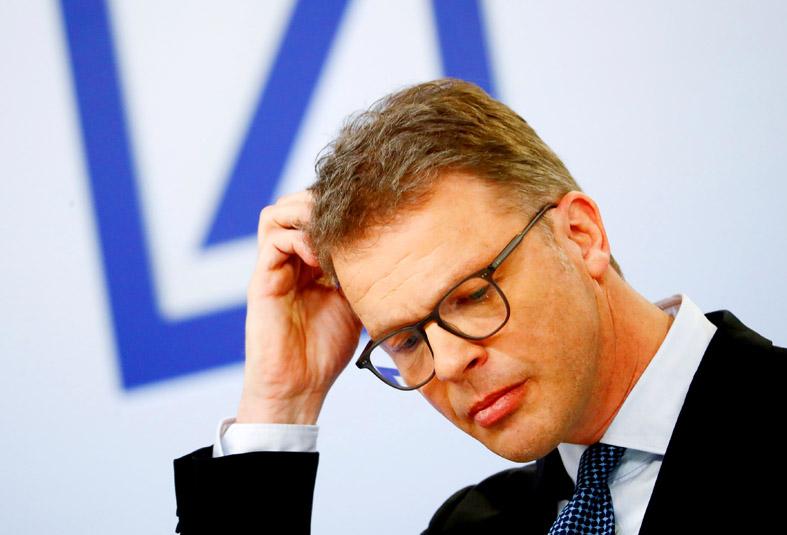Deutsche Bank AG on Sunday said it began a probe in relation to engagement with some clients after the Financial Times reported that the German lender was investigating the alleged misselling of investment banking products.
“We initiated an investigation in relation to our engagement with a limited number of clients. We cannot comment on details of the investigation until it is complete,” a Deutsche Bank spokesman said in an e-mailed statement.
The Financial Times reported that the lender was probing if its staff missold sophisticated investment banking products to clients in breach of EU rules, and then colluded with individuals within these companies to share the profits.

Photo: Reuters
The internal probe was triggered by client complaints last year, the newspaper reported, citing people familiar with the process, adding that the investigation initially focused on the desk in Spain, which sells hedges, swaps, derivatives and other financial products.
An audit had found that the bank wrongly categorized client firms under the Markets in Financial Instruments Directive rules, which require banks to separate their clients by levels of financial sophistication, according to the newspaper.
Sources told the newspaper that the lender believes some of its staff knowingly sold inappropriate or unsuitable products to customers who might not have been able to understand and shoulder the risk they were taking with these positions.
The probe, called Project Teal, is also looking into accusations that there was collusion between the German bank’s employees and staff at some of the clients who bought the inappropriate products.
The scope of the investigation was extended to the rest of Europe, but it was believed only Spain and Portugal-based clients were affected, a source told the Financial Times.
The probe is drawing to a conclusion and the bank would have to soon make final disclosures to regulators, the newspaper said, adding that the bank’s primary regulators, Germany’s BaFin and the European Central Bank, have been informed.

UNCERTAINTY: Innolux activated a stringent supply chain management mechanism, as it did during the COVID-19 pandemic, to ensure optimal inventory levels for customers Flat-panel display makers AUO Corp (友達) and Innolux Corp (群創) yesterday said that about 12 to 20 percent of their display business is at risk of potential US tariffs and that they would relocate production or shipment destinations to mitigate the levies’ effects. US tariffs would have a direct impact of US$200 million on AUO’s revenue, company chairman Paul Peng (彭雙浪) told reporters on the sidelines of the Touch Taiwan trade show in Taipei yesterday. That would make up about 12 percent of the company’s overall revenue. To cope with the tariff uncertainty, AUO plans to allocate its production to manufacturing facilities in

TAKING STOCK: A Taiwanese cookware firm in Vietnam urged customers to assess inventory or place orders early so shipments can reach the US while tariffs are paused Taiwanese businesses in Vietnam are exploring alternatives after the White House imposed a 46 percent import duty on Vietnamese goods, following US President Donald Trump’s announcement of “reciprocal” tariffs on the US’ trading partners. Lo Shih-liang (羅世良), chairman of Brico Industry Co (裕茂工業), a Taiwanese company that manufactures cast iron cookware and stove components in Vietnam, said that more than 40 percent of his business was tied to the US market, describing the constant US policy shifts as an emotional roller coaster. “I work during the day and stay up all night watching the news. I’ve been following US news until 3am

COLLABORATION: Given Taiwan’s key position in global supply chains, the US firm is discussing strategies with local partners and clients to deal with global uncertainties Advanced Micro Devices Inc (AMD) yesterday said it is meeting with local ecosystem partners, including Taiwan Semiconductor Manufacturing Co (TSMC, 台積電), to discuss strategies, including long-term manufacturing, to navigate uncertainties such as US tariffs, as Taiwan occupies an important position in global supply chains. AMD chief executive officer Lisa Su (蘇姿丰) told reporters that Taiwan is an important part of the chip designer’s ecosystem and she is discussing with partners and customers in Taiwan to forge strong collaborations on different areas during this critical period. AMD has just become the first artificial-intelligence (AI) server chip customer of TSMC to utilize its advanced

Six years ago, LVMH’s billionaire CEO Bernard Arnault and US President Donald Trump cut the blue ribbon on a factory in rural Texas that would make designer handbags for Louis Vuitton, one of the world’s best-known luxury brands. However, since the high-profile opening, the factory has faced a host of problems limiting production, 11 former Louis Vuitton employees said. The site has consistently ranked among the worst-performing for Louis Vuitton globally, “significantly” underperforming other facilities, said three former Louis Vuitton workers and a senior industry source, who cited internal rankings shared with staff. The plant’s problems — which have not